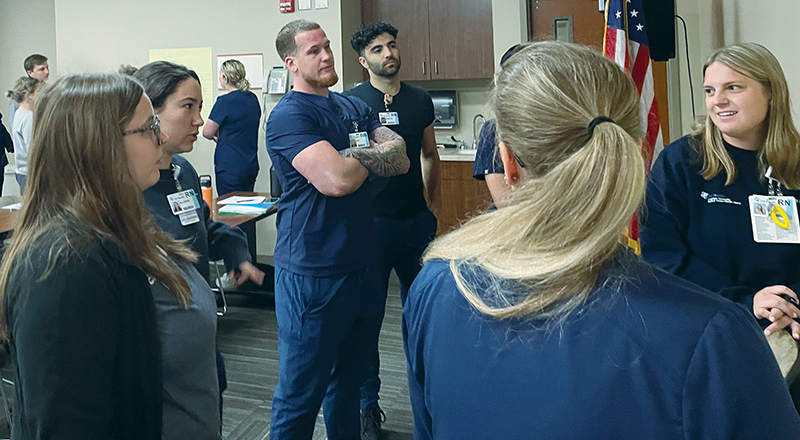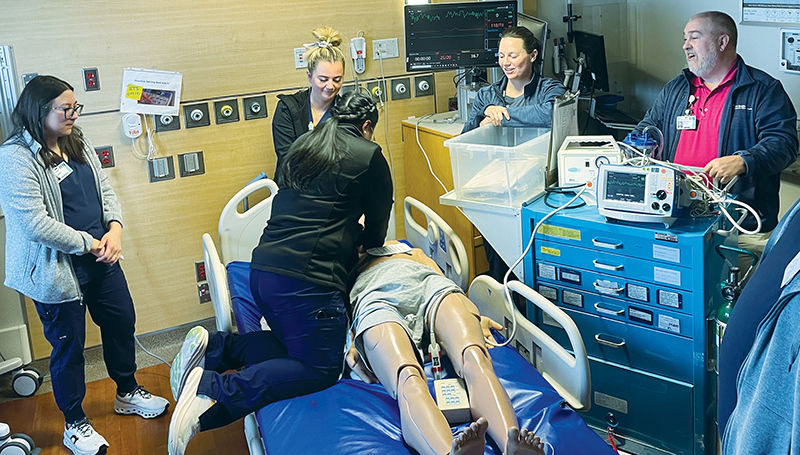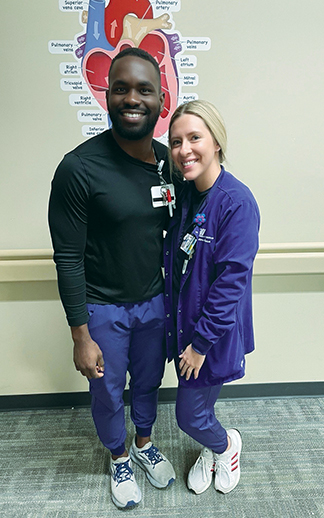 Nurses in the yearlong residency program at CHI Health get both clinical training and didactic education.
Nurses in the yearlong residency program at CHI Health get both clinical training and didactic education.
In her dual roles in the new nurse residency program at CHI Health Nebraska in Lincoln, Tayler Hansen can do her job on the hospital floor or in a coffee shop.
In one role, Hansen is a teacher, helping to train fledgling nurses in the techniques and knowledge they will need to care for patients. In the other, she mentors a protégé through the ups and downs of nursing when they are off the floor.
"As a preceptor, I am training somebody how to care for patients," Hansen says. "But when I'm a mentor, I'm someone they can lean on if they're having a hard time. Investing in such programs like this, we are not only supporting our new nurses, we are
also strengthening the entire health care system for better patient care and outcomes."
 Plante
Plante
Tim Plante, the chief nursing officer over the central region of CommonSpirit Health, says the residency program began last year as part of an effort across the system to address a lack of qualified personnel. CHI Health, based in Omaha, Nebraska, is
part of CommonSpirit's central region. It operates 26 hospitals.
The residency program at CHI Health is done in cohorts so new nurses build relationships with peers and their preceptors and mentors. The first cohort session ended in June with 104 graduates. As of late July, over 180 nurses had graduated and the sixth
cohort session had begun. Another group will start the program in October.
One of the June graduates is Josiah Oyebefun, a Nigerian native who came to Nebraska via the Caribbean. He says the new setup helped him learn firsthand.
"If you ever have any questions or need help with anything, there's always a nurse around with more experience who knows what's going on and can assist you," Oyebefun says. "But also, whenever you have some downtime or whatever, you learn and start to
get exposure to the more critical patients."
Evidence-based model
Plante says in developing the yearlong residency program, CommonSpirit nursing leaders did a deep dive into the latest research on how nurses learn and what they retain from training.
 Resident nurses in the CHI Health program get hands-on training with a manikin.
Resident nurses in the CHI Health program get hands-on training with a manikin.
"They put together actually a whole department that manages this from the national standpoint," he says. "We were one of the first regions to go up with it. Our national team came up with the theory behind it, but they engaged our local educators, and
it's managed and operated locally."
CHI Health has given special attention to what's needed both by the preceptors and by the residents they are helping to guide.
"Number one, we were very deliberate in seeking out the people who wanted to teach, but we gave them extra training before they could teach our newer nurses," Plante says. "And we also extended the orientation time (for the trainees), so rather than 12
weeks, we offer up to six months of one-on-one training so that we're not pushing the nurses out of the nest. They tell us they're ready versus us assuming or really pushing to get them off orientation, which was a practice that we have had before."
The residency program includes clinical training and didactic education. Plante says the nonclinical portion was specifically designed to expand on what the resident nurses have covered in school. "We increased the difficulty of our didactic classes to
make sure that they were finding value and that they were leaving with a higher skill set," he says.
In some cases, Plante adds, the training has been described as too hard — a gripe that he says showed that CommonSpirit was on the right track. "That was music to my ears, right? Because nursing is not easy. Nursing is hard, and patients are sicker than
they've ever been," Plante says. "So we need to prepare these nurses."
In addition to working with preceptors on the job, the nurse residents get a mentor who meets with them regularly away from the workplace. Some of those mentors volunteer, others are recruited.
High retention
Plante says the retention rate for nurses who are in or who have graduated from the residency program is about 95%. That rate stands out among the current generation of nurses, he says.
"For Gen Z, changing jobs is literally part of their identity," he notes. "Things like job anxiety and stress are just a catalyst when you're talking about nurse training."
 Josiah Oyebefun was among the nurse residency program's first graduates. Tayler Hansen is a trainer and mentor in the program.
Josiah Oyebefun was among the nurse residency program's first graduates. Tayler Hansen is a trainer and mentor in the program.
During the COVID pandemic, Plante says, a troubling trend of high turnover among nurses worsened.
"A lot of hospitals moved to more simulation using manikins," he says. "There's some really high-fidelity, lifelike manikins, but it's very different than having a real clinical experience with live patients in the acute care setting. Also, during COVID,
a lot of health systems limited the access that students had to these clinical experiences because of exposure and because of supplies."
Firsthand relationships
Oyebefun appreciated the residency program's person-to-person approach. He notes that with a mother who is a nurse and a father who is a microbiologist, he grew up around science. But to master the skills he
needed on the patient floor, the nurse residency program was a big step forward.
"I like having the relationship with people rather than being in a lab more secluded," he says. "You learn a lot about the science of caring for people, the physiology behind it all. But I'm also getting to relate to people on a regular basis, just learning
about them. Every patient that comes through has a unique story. We're able to take them from point A to point B where they come with an issue, and then we're able to see them leave improved in health. You get to be a little piece of that.
"The job gets more complex with the more skills you learn because you get introduced to a new role. But you're trained well and prepared for it. The preceptors make sure you're learning and prepared," he says.
Hansen, who works on cardiac units, recalls how her own training was different from the preceptor relationship she has been able to establish under the CHI program.
"I was paired with a nurse for about six weeks and followed them," she said. "I feel like this nurse residency program definitely has a stronger impact on our newer nurses."
Smoothing the transition
And the support mentors provide off the hospital floor is valuable in a reinforcing way, Hansen adds.
"We meet with these mentees once a month and we say, 'Hey, what are you having trouble with understanding? Do you want to go over heart rhythms? Do you want to go over how to run a code? Do you want to learn how to appropriately manage your time at work?
How are you handling working night shift? How are you emotionally and mentally?'" she says. "Night shift could be draining for our rotating nurses. So this mentorship program provides mental and knowledge support."
It's all about taking care of the whole person, she says, in all their roles.
"We understand that the transition from the classroom to the bedside can be challenging," Hansen says, "and the program that we offer aims to bridge that gap effectively. If they're having problems with learning heart rhythms or recovering hearts, or
they want to learn how to change a wound dressing, we can go over that. Or if they just wanna talk about life, see if anything's bothering them, we can do that."
From the mentee point of view, Oyebefun says, the holistic approach has been a key to success.
"You can start with a leg up and be at a better starting point," he says. "That's what I've really appreciated about it. It's also created a resource of someone you can lean on, whether it's a quick check about a difficult situation you dealt with or
learning about something you're unsure about. It just gives you a direct line of support."